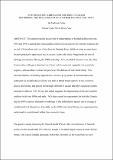Files in this item
Anti-socialism, liberalism and individualism : rethinking the realignment of Scottish politics, 1945–1970
Item metadata
| dc.contributor.author | Petrie, Malcolm Robert | |
| dc.date.accessioned | 2018-11-12T16:30:15Z | |
| dc.date.available | 2018-11-12T16:30:15Z | |
| dc.date.issued | 2018-12 | |
| dc.identifier | 255093055 | |
| dc.identifier | b5d42da4-9d8c-4b33-94ff-90e1a49ec158 | |
| dc.identifier | 85064499567 | |
| dc.identifier.citation | Petrie , M R 2018 , ' Anti-socialism, liberalism and individualism : rethinking the realignment of Scottish politics, 1945–1970 ' , Transactions of the Royal Historical Society , vol. 28 , pp. 197-217 . https://doi.org/10.1017/S0080440118000105 | en |
| dc.identifier.issn | 0080-4401 | |
| dc.identifier.other | ORCID: /0000-0001-6399-2463/work/60427437 | |
| dc.identifier.uri | https://hdl.handle.net/10023/16439 | |
| dc.description | The author would like to acknowledge the generous support offered by the award of an early career fellowship by the Leverhulme Trust (ECF–2015–391), which facilitated the research that informs this article. | en |
| dc.description.abstract | This paper presents an alternative interpretation of Scottish politics between 1945 and 1970, a period that witnessed the decline of a once-powerful Unionist tradition, the revival of Liberalism and the rise of the Scottish National party (SNP). While existing accounts have focused principally upon social and economic factors, this study foregrounds the role of ideology and rhetoric. During the 1940s and early 1950s, Scottish Unionists were, like their Conservative colleagues elsewhere in Britain, able to construct a popular, but essentially negative, anti-socialist coalition that prioritised the defence of individual liberty. This electoral alliance, defined by opposition to Labour's programme of nationalisation and expressed via an individualist idiom, was able to attract broad support; it was, however, always provisional, and proved increasingly difficult to sustain after the Conservative party returned to office in 1951. It was, this paper suggests, the fragmenting of this anti-socialist coalition in the late 1950s and early 1960s that created the opportunity for both the Liberals and the SNP to present alternative renderings of this individualist appeal, and to emerge as credible political alternatives. Crucially, by the 1960s, individual liberty was beginning to be understood in constitutional rather than economic terms. | |
| dc.format.extent | 242557 | |
| dc.language.iso | eng | |
| dc.relation.ispartof | Transactions of the Royal Historical Society | en |
| dc.subject | DA Great Britain | en |
| dc.subject | D839 Post-war History, 1945 on | en |
| dc.subject | JA Political science (General) | en |
| dc.subject | T-NDAS | en |
| dc.subject | BDC | en |
| dc.subject | R2C | en |
| dc.subject.lcc | DA | en |
| dc.subject.lcc | D839 | en |
| dc.subject.lcc | JA | en |
| dc.title | Anti-socialism, liberalism and individualism : rethinking the realignment of Scottish politics, 1945–1970 | en |
| dc.type | Journal article | en |
| dc.contributor.sponsor | The Leverhulme Trust | en |
| dc.contributor.institution | University of St Andrews. School of History | en |
| dc.contributor.institution | University of St Andrews. Institute of Legal and Constitutional Research | en |
| dc.identifier.doi | https://doi.org/10.1017/S0080440118000105 | |
| dc.description.status | Peer reviewed | en |
| dc.date.embargoedUntil | 2018-11-02 | |
| dc.identifier.grantnumber | ECF-2015-391 | en |
This item appears in the following Collection(s)
Items in the St Andrews Research Repository are protected by copyright, with all rights reserved, unless otherwise indicated.

